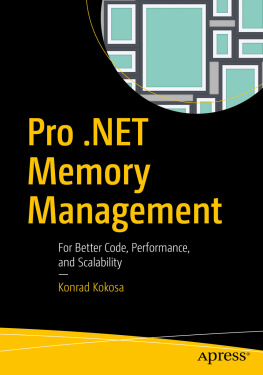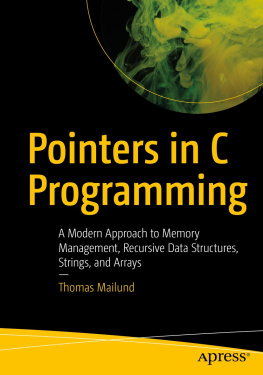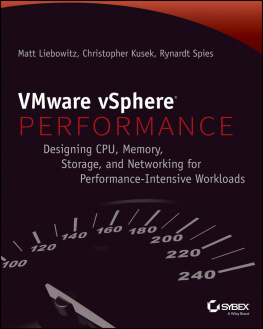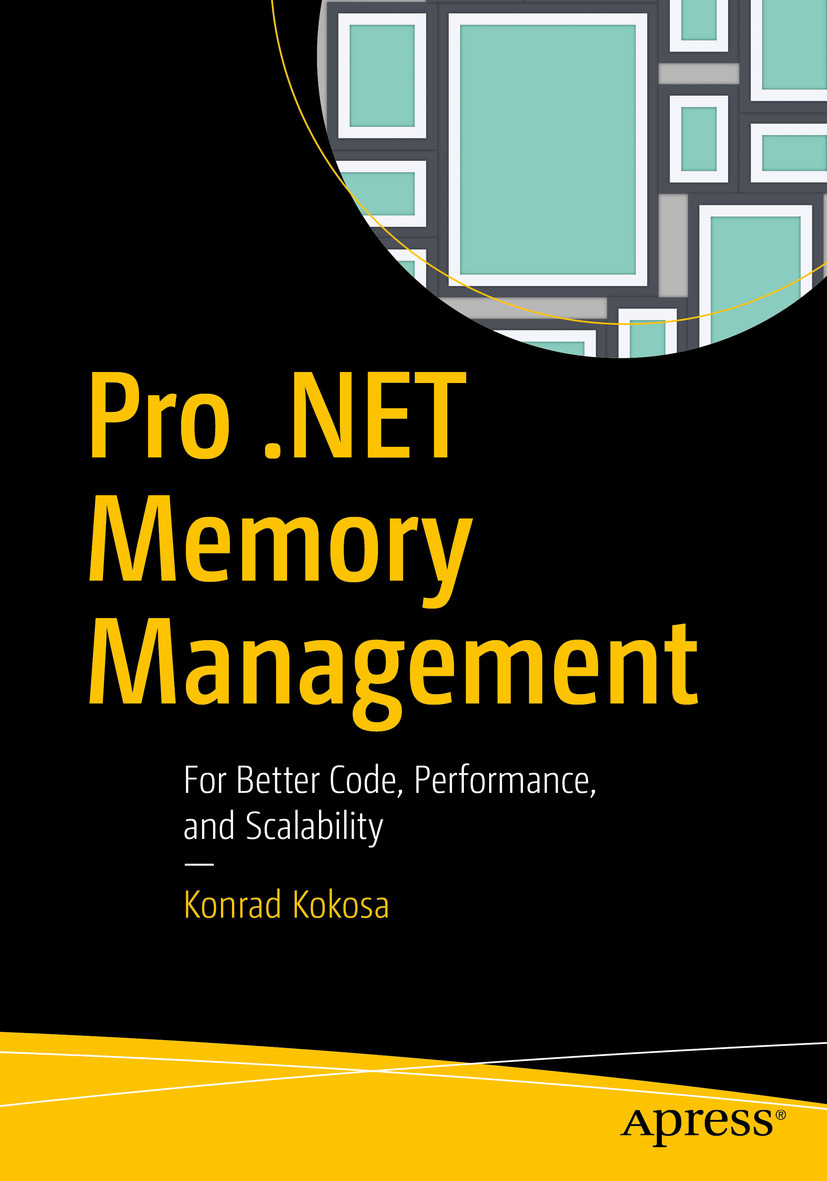Konrad Kokosa
Pro .NET Memory Management For Better Code, Performance, and Scalability
Konrad Kokosa
Warsaw, Poland
Any source code or other supplementary material referenced by the author in this book is available to readers on GitHub via the books product page, located at www.apress.com/9781484240267 . For more detailed information, please visit http://www.apress.com/source-code .
ISBN 978-1-4842-4026-7 e-ISBN 978-1-4842-4027-4
https://doi.org/10.1007/978-1-4842-4027-4
Library of Congress Control Number: 2018962862
Konrad Kokosa 2018
This work is subject to copyright. All rights are reserved by the Publisher, whether the whole or part of the material is concerned, specifically the rights of translation, reprinting, reuse of illustrations, recitation, broadcasting, reproduction on microfilms or in any other physical way, and transmission or information storage and retrieval, electronic adaptation, computer software, or by similar or dissimilar methodology now known or hereafter developed.
Trademarked names, logos, and images may appear in this book. Rather than use a trademark symbol with every occurrence of a trademarked name, logo, or image we use the names, logos, and images only in an editorial fashion and to the benefit of the trademark owner, with no intention of infringement of the trademark. The use in this publication of trade names, trademarks, service marks, and similar terms, even if they are not identified as such, is not to be taken as an expression of opinion as to whether or not they are subject to proprietary rights.
While the advice and information in this book are believed to be true and accurate at the date of publication, neither the authors nor the editors nor the publisher can accept any legal responsibility for any errors or omissions that may be made. The publisher makes no warranty, express or implied, with respect to the material contained herein.
Distributed to the book trade worldwide by Springer Science+Business Media New York, 233 Spring Street, 6th Floor, New York, NY 10013. Phone 1-800-SPRINGER, fax (201) 348-4505, e-mail orders-ny@springer-sbm.com, or visit www.springeronline.com. Apress Media, LLC is a California LLC and the sole member (owner) is Springer Science + Business Media Finance Inc (SSBM Finance Inc). SSBM Finance Inc is a Delaware corporation.
To my beloved wife, Justyna, without whom nothing really valuable would happen in my life.
Foreword
When I joined the Common Language Runtime (the runtime for .NET) team more than a decade ago, little did I know this component called the Garbage Collector was going to become something I would spend most of my waking moments thinking about later in my life. Among the first few people I worked with on the team was Patrick Dussud, who had been both the architect and dev for the CLR GC since its inception. After observing my work for months, he passed the torch, and I became the second dedicated GC dev for CLR.
And so my GC journey began. I soon discovered how fascinating the world of garbage collection was - I was amazed by the complex and extensive challenges in a GC and loved coming up with efficient solutions for them. As the CLR was used in more scenarios by more users, and memory being one of the most important performance aspects, new challenges in the memory management space kept coming up. When I first started, it was not common to see a GC heap that was even 200mb; today a 20GB heap is not uncommon at all. Some of the largest workloads in the world are running on CLR. How to handle memory better for them is no doubt an exciting problem.
In 2015 we open sourced CoreCLR. When this was announced, the community asked whether the GC source would be excluded in the CoreCLR repo - a fair question as our GC included many innovative mechanisms and policies. The answer was a resounding no, and it was the same GC code we used in CLR. This clearly attracted some curious minds. A year later I was delighted to learn that one of our customers was planning to write a book specifically about our GC. When a technology evangelist from our Polish office asked me if I would be available to review Konrads book, of course I said yes!
As I received chapters from Konrad, it was clear to me that he studied our GC code with great diligence. I was very impressed with the amount of detail covered. Sure, you can build CoreCLR and step through the GC code yourself. But this book will definitely make that easier for you. And since an important class of readers of this book is GC users, Konrad included a lot of material to better understand the GC behavior and coding patterns to use the GC more efficiently. There is also fundamental information on memory at the beginning of the book and discussions of memory usage in various libraries toward the end. I thought it was a perfect balance of GC introduction, internals, and usage.
If you use .NET and care about memory performance, or if you are just curious about the .NET GC and want to understand its inner workings, this is the book to get. I hope you will have as much enjoyment reading it as I did reviewing it.
Maoni Stephens
July 2018
Introduction
In computer science, memory has been always there - from the punch cards, through magnetic tapes to the nowadays, sophisticated DRAM chips. And it will be always there, probably in the form of sci-fi holographic chips or even much more amazing things that we are now not able to imagine. Of course, the memory was there not without a reason. It is well known that computer programs are said to be algorithms and data structures joined together. I like this sentence very much. Probably everyone has at least once heard about the Algorithms + Data Structures = Programs book written by Niklaus Wirth (Prentice Hall, 1976), where this great sentence was coined.
From the very beginning of the software engineering field, memory management was a topic known by its importance. From the first computer machines, engineers had to think about the storage of algorithms (program code) and data structures (program data). It was always important how and where those data are loaded and stored for later use.
In this aspect, software engineering and memory management have been always inherently related, as much as software engineering and algorithms are. And I believe it always will be like that. Memory is a limited resource, and it always will be. Hence, at some point or degree, memory will always be kept in the minds of future developers. If a resource is limited, there always can be some kind of bug or misuse that leads to starvation of this resource. Memory is not an exception here.
Having said that, there is for sure one thing that is constantly changing regarding memory management - the quantity. First developers, or we should name them engineers, were aware of every single bit of their programs. Then they had kilobytes of memory. From each and every decade, those numbers are growing and today we are living in times of gigabytes, while terabytes and petabytes are kindly knocking into the door waiting for their turn. As the memory size grows, the access times decrease, making it possible to process all this data in a satisfying time. But even though we can say memory is fast, simple memory-management algorithms that try to process all gigabytes of data without any optimizations and more sophisticated tunings would not be feasible. This is mostly because memory access times are improving slower than the processing power of CPUs utilizing them. Special care must be taken to not introduce bottlenecks of memory access, limiting the power of todays CPUs.















